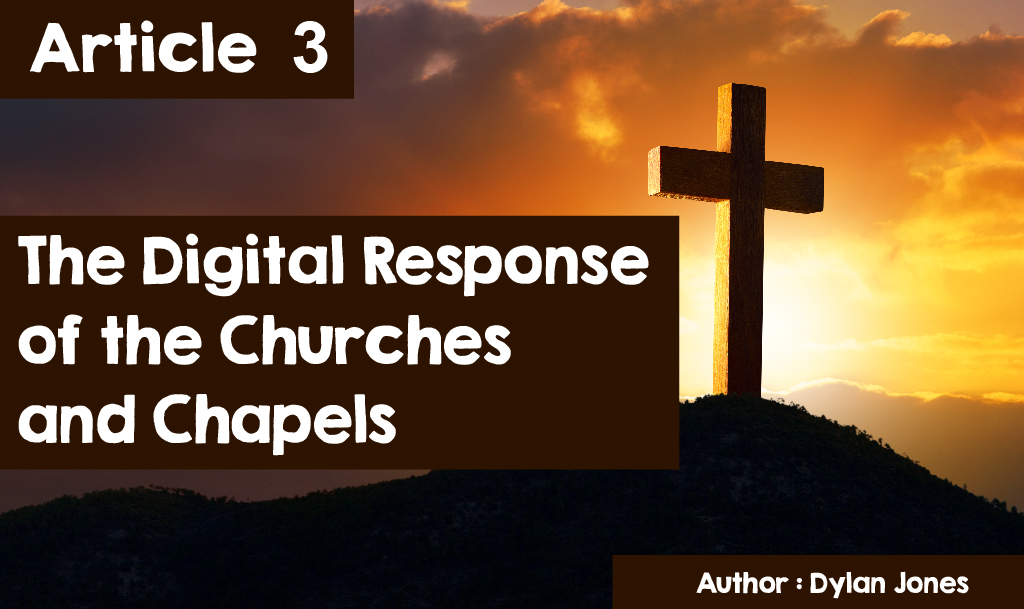The digital response of the churches and chapels

Old-fashioned, boring, belonging to the past - these are some pretty common comments about chapel and church services, especially from young people. But the attempt by the churches and chapels to change the form and content of their services has been slow. However, with the advent of the Covid-19 pandemic, not only Christian places of worship but also places of worship in other religions were dragged by their feet into the twenty-first century. When the Welsh Government ordered that all places of worship must close in March 2020, they had to look for other ways of worshipping. Otherwise, they could face complete extinction. Although some places of worship have a long tradition of using the new technology, it has been an entirely new experience for most and their members. But, in recent months, as places of worship rise to the challenge of the pandemic, words such as YouTube, Facebook, Zoom, Digital Service and Skype have become a natural part of the vocabulary of many believers.
Response methods have generally been similar throughout Wales - Casia William sums it up in her poem –
God is there, God is on Zoom.

Ond rŵan, a ninnau yng nghanol
y tywyllwch tywyllaf,
dyma fo, ar fy nglin,
lond y sgrin,
lond y gegin.
Duw ar Zoom.
See the complete poem - http://cristnogaeth21.cymru/category/e-fwletin/
Many chapels have been running a service on Zoom every Sunday morning, while others have been running a Sunday School on Facebook. Another method that has proved popular is daily or weekly reflections on Facebook or YouTube. Of course, not all members have access to the internet and, so, different media have to be provided to them – a hard copy or CD. In some areas, people sang hymns in the street, everyone in the doorway or garden of his/her own house. However, in addition to service and prayer meetings, some chapels and churches have been holding coffee mornings on Zoom, so that its members have the opportunity to chat and socialise together. Yet, if there is no internet access you must keep in touch by phone.

"We all had to learn a lot in a short space of time," said Rhys Llwyd, minister of Capel Caersalem, Caernarfon. "What I did was broadcast a service live on Facebook and YouTube - what was good on Facebook was that there was an opportunity for people to respond on chat. We also gave families the opportunity to connect live on Facebook after the service, so that children could see each other. During the week two prayer meetings have been held on Skype. ”
Another chapel that wanted to make sure the children got some normality was Capel y Morfa, Aberystwyth.

Through the internet, teacher Catherine Griffiths, ensured that Sunday School children were able to draw a Mother's Day card and, as usual, on Sunday mornings there was also biscuit time. "What I did was provide a video in advance and then make sure it is played at 10.30 on Facebook - which is normal Sunday School time," said Catherine. . "The video was then available to the Morfa Nursery group - they heard the story of Moses in the bulrushes first, then they got a Mother's Day card and there was a chance to be part of a song too."
The Archbishop of Wales, John Davies, urged people to put a lighted candle in their window - a singular event but having many doing it "it's a joint event and unites us as Christians - it keeps people part of God's family," added the Bishop of Bangor, Andy John.
The media, television and radio, also responded. There were additional programs from Dechrau Canu, Dechrau Canmol on Sunday mornings at 11am on S4C. It was an opportunity, say the producers, to "deliver reflection, prayer and song".

On Radio Cymru, in addition to the usual Morning Reflection, there was a word of reflection twice a week during the Bore Cothi programme by ministers across Wales. The Sunday service on Radio Cymru also tried to help people face anxiety and loneliness during the lockdown.
Other religions have also been encouraged to look for alternative ways to meet the needs of their members. The Muslim Council of Britain urged mosques to have plans in place for the Ramadan period as it could not be celebrated in the usual way, as people would not be allowed to gather en masse. The Kadamapa Kalpa Bhadra Centre for Buddhism in Llandudno, Bangor and Mold has been temporarily closed and the courses available on the web. The Sikh community has also been preparing to try to cope in new circumstances, with Gurdwaras being encouraged to consider alternative plans to celebrate holidays.

To what extent have these approaches been successful? Through technology, places of worship around the world have reached a record audience - far more than the numbers who usually frequent places of worship. Here are some comments from members of chapels and churches,
"Online services are mostly more creative, visual and concise than normal. I really like seeing words and pictures on screen.”
"I really like the flexibility that online services offer, as the services can be switched on and off at different times of the week."
So, why not re-open the places of worship? Are people looking forward to having the opportunity to go back to services? This is the view of a Bro Uwchaled Pastorate member who reflects on not only his fellow members’ views but also on those of members of places of worship across Wales, “I have enjoyed the on-line provision, but it doesn’t compare with going to a real service. I believe it is important for me, as a Christian, to take every opportunity to worship, to share experience, to share the sorrow and to share the joy of my faith. ”


